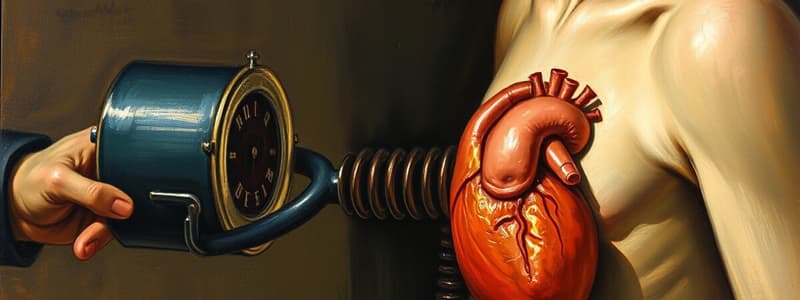Podcast
Questions and Answers
What determines Cardiac Output (CO)?
What determines Cardiac Output (CO)?
- Stroke Volume (SV) and Heart Rate (HR) (correct)
- Blood Volume and Heart Rate (HR)
- Systemic Vascular Resistance (SVR) and Heart Rate (HR)
- Stroke Volume (SV) and Arterial Pressure
What effect does narrow arterioles have on blood pressure?
What effect does narrow arterioles have on blood pressure?
- Has no effect on systemic vascular resistance
- Increases blood pressure due to increased resistance (correct)
- Decreases blood pressure and peripheral resistance
- Decreases blood pressure due to increased diameter
What type of signals do high pressure baroreceptors send to the Central Nervous System?
What type of signals do high pressure baroreceptors send to the Central Nervous System?
- Afferent signals for both high and low blood pressure (correct)
- Efferent signals for cardiac output
- Signals only for peripheral vascular resistance
- Inhibitory signals only for hypotension
During an increase in blood pressure, how does the aortic baroreceptor respond?
During an increase in blood pressure, how does the aortic baroreceptor respond?
Which medication is associated with altering Cardiac Output?
Which medication is associated with altering Cardiac Output?
What is the definition of isolated systolic hypertension?
What is the definition of isolated systolic hypertension?
Which condition is associated with a significant percentage of resistant hypertension cases?
Which condition is associated with a significant percentage of resistant hypertension cases?
What is a recommended action during malignant hypertension?
What is a recommended action during malignant hypertension?
What is the prevalence of hypertension among Canadian adults?
What is the prevalence of hypertension among Canadian adults?
Which of the following factors is NOT associated with hypertensive urgency?
Which of the following factors is NOT associated with hypertensive urgency?
Flashcards are hidden until you start studying
Study Notes
Hypertension Mechanism
- Blood pressure (BP) is the pressure in large arteries and is influenced by cardiac output (CO) and systemic vascular resistance (SVR).
- Baroreceptors, located in carotid arteries and the aorta, play a critical role in regulating BP:
- High-pressure baroreceptors respond to changes in arterial pressure, sending signals to the Central Nervous System (CNS) to adjust CO and peripheral resistance.
- Carotid baroreceptors respond to both increases and decreases in BP through the Glossopharyngeal nerve (CN IX).
- Aortic baroreceptors respond solely to increases in BP and communicate via the Vagus nerve (CN X).
- A drop in BP, such as in hypovolemic shock, decreases action potentials from baroreceptors, reducing inhibition of sympathetic activity and leading to elevated pressure.
Blood Pressure Equation
- BP can be mathematically understood as:
- BP = CO x SVR
- Cardiac output is determined by:
- CO = Stroke Volume (SV) x Heart Rate (HR)
Selected Medications
- Esmolol: Primarily influences cardiac output.
- Nitroprusside and Nitroglycerin: Affect systemic vascular resistance.
- Clevidipine: Used for high systolic BP (SBP > 210), diastolic BP (DBP > 130), addressing acute hypertensive situations.
Prevalence of Hypertension in Canadian Adults
- General hypertension prevalence is approximately 20%.
- Resistant hypertension accounts for about 2% of cases.
- Chronic hypertension may arise without identifiable causes.
Types of Hypertension
- Primary Hypertension: Unknown etiology, developed over time, associated with various risk factors.
- Secondary Hypertension: Sudden onset due to underlying conditions or medications.
Clinical Manifestations and Complications
- Untreated hypertension may result in target organ damage, including issues related to cardiovascular health.
- More than half of hypertension patients exhibit other cardiovascular risk factors, such as diabetes and metabolic syndrome.
Screening and Diagnosis
- Sphygmomanometer: Device for measuring BP, consisting of an inflatable cuff and measurement unit.
- Auscultatory technique employs a stethoscope for accurate readings.
- Ambulatory BP Monitoring (ABPM): Records BP at regular intervals during daily activities over 24 hours, assessing readings for hypertension management.
Risk Factors for Hypertension
- Modifiable: Unhealthy lifestyle choices (diet, alcohol consumption).
- Non-modifiable: Age, genetics, and pre-existing medical conditions like diabetes and renal disease.
Major Medications
- Hydralazine: Dilates arterioles using nitric oxide (NO); side effects include headache and potential myocardial ischemia.
- Minoxidil: Metabolized into a K+ channel opener, effective in hypertension management but has notable side effects, including hypertrichosis.
Additional Key Points
- Isolated systolic hypertension is common in elderly populations; characterized by SBP > 140 mmHg and DBP < 90 mmHg.
- The importance of correcting lifestyle factors to effectively manage blood pressure.
Studying That Suits You
Use AI to generate personalized quizzes and flashcards to suit your learning preferences.




